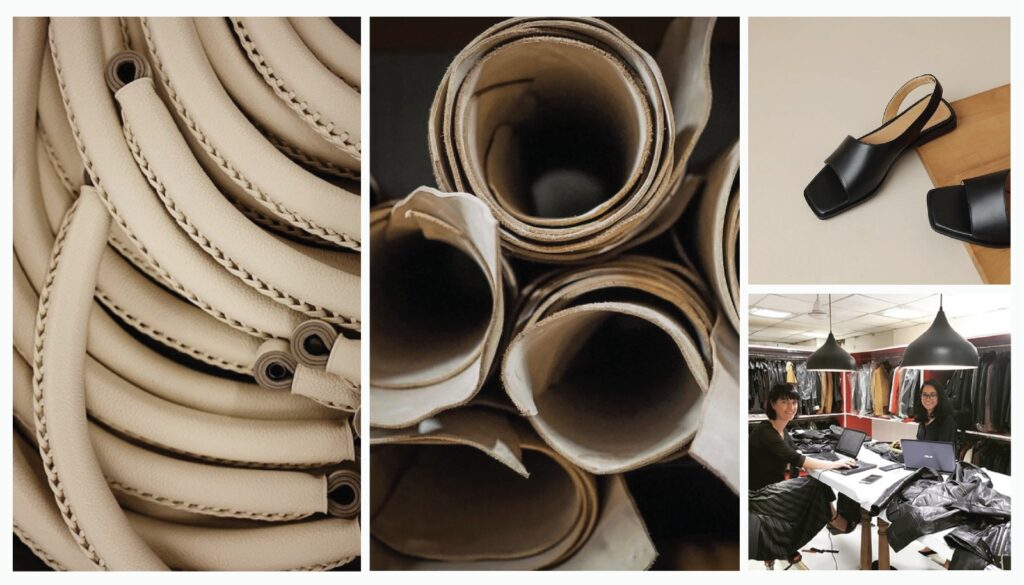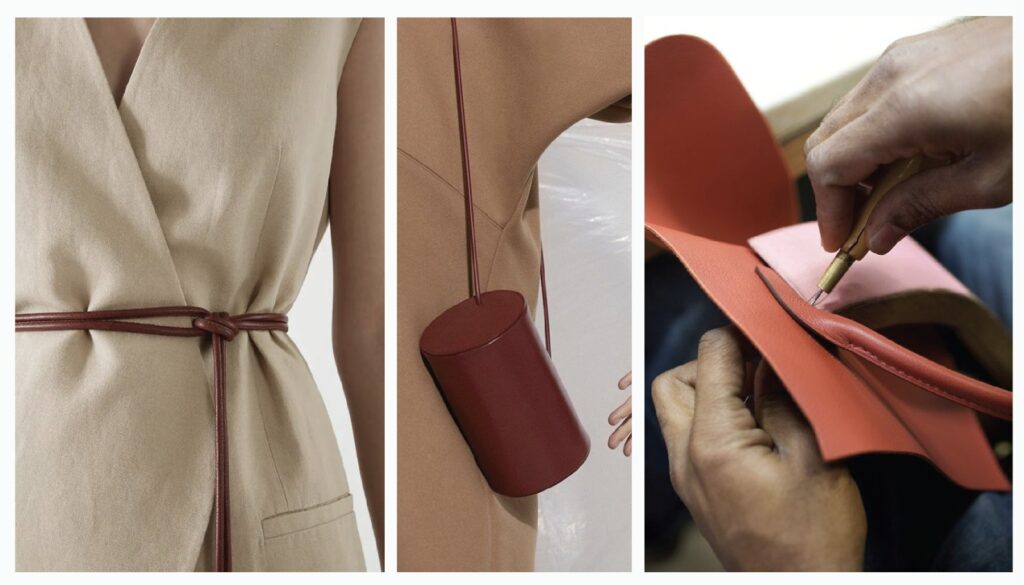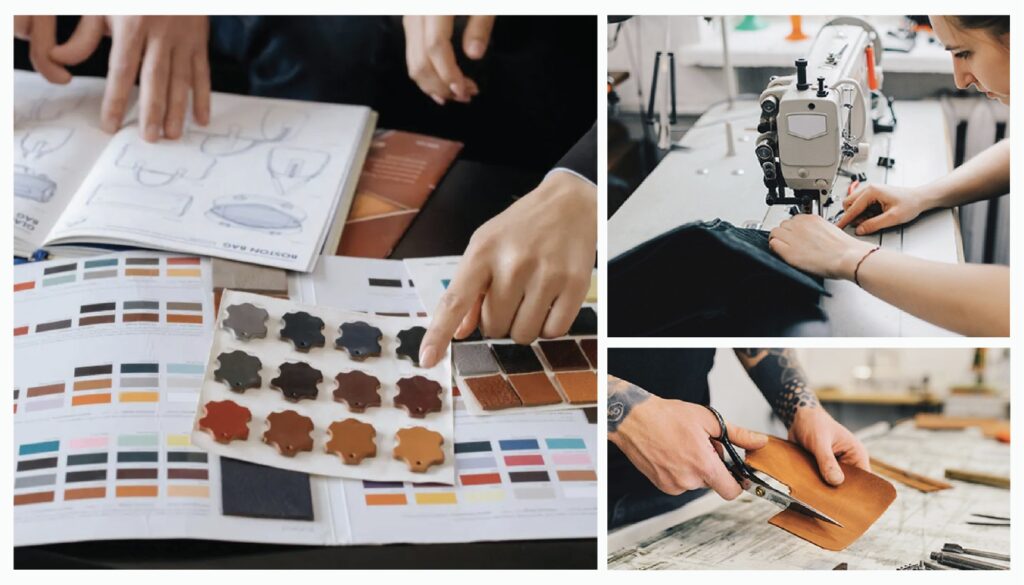
Portugal and Spain stand at the forefront of the leather industry, their legacy woven into the fabric of global fashion. These nations are renowned for their leather accessories production and dedication to craftsmanship. A craftsmanship where traditional methods meet contemporary designs.
Their artisans, guardians of a rich heritage, are celebrated for creating unique leather goods. Goods that are not only luxurious but also embody a commitment to quality. In these regions, leather accessories are more than products. They are a testament to a time-honored craft that continues to flourish in the modern era.
As we delve into the heart of these countries, we uncover the essence of what makes their leather accessories unparalleled on the world stage. To achieve this, we will take you on an exciting journey. A voyage that explores the tradition, offerings, mastery, and quality, behind leather accessories production. Last but not least, we will examine Deepwear’s role within the sector. Let’s dive in!
The Craftsmanship Tradition of Leather Accessories Production
The tapestry of leather craftsmanship in Portugal and Spain weaves a rich narrative with skill, dedication, and passion. Artisans in these lands are custodians of a tradition that spans centuries. Their skilled hands meticulously shape the leather goods that are revered worldwide.
In Portugal, the art of creating handmade leather shoes is a cultural hallmark. Each stitch telling a story of heritage and pride. These shoes are not merely footwear; they are masterpieces of craft, symbolizing the essence of Portuguese identity.
Similarly, in Spain, the production of leather bags showcases an unmatched level of craftsmanship. It is paticulalry true for those from the pueblo Blancho of Ubrique in Cadiz province, Andalusia. These bags, celebrated for their elegance and durability, set a global standard in fashion. It is this very tradition of excellence that forms the cornerstone of the reputation that Portuguese and Spanish leather goods enjoy today.
As we see, these countries offer far more than mere accessories. They present a legacy of artistry that is unparalleled. A testament to the enduring passion and skill of their artisans. This legacy is a bridge between the past and the present. It ensures the survival and relevance of their craftsmanship in today’s fashion landscape.
Unique Offerings from Portugal
The Portuguese leather industry is distinguished by its unique offerings, setting a global benchmark for quality and craftsmanship. Esteemed for their exceptional quality, Portuguese leather shoes epitomize the nation’s mastery over leatherwork. Combining age-old techniques with cutting-edge designs, Portuguese artisans craft leather boots and sandals that are not only stylish but also enduring.
The attention to detail and the scrupulous selection of materials guarantee that each piece provides unmatched comfort and aesthetic appeal. This unwavering dedication to craftsmanship propels Portugal to the forefront of leather fashion, offering products that mirror the rich artisanal heritage and the evolving demands of the modern market.
The hallmark of Portuguese leather goods lies in their extraordinary beauty. Further it is present in their capacity to weave tradition with contemporary trends seamlessly. It’s this unique blend that makes Portuguese leather goods highly sought after. Thus embodying the spirit of innovation while staying rooted in tradition.
The leather industry in Portugal not only celebrates the past but also embraces the future, ensuring that its legacy continues to thrive and inspire the global fashion arena. Here are some useful facts about the sector:
- In 2023 the export of leather and leather goods from Portugal increased by 29%, amounting to 197 million euros.
- At present there are 120 Portuguese leather and leather goods companies.
- In the last ten years, there was an increase of 86% in jobs in the sector.
In terms of regions, the leather industry is predominantly centered around Alcanena and São João da Madeira. Alcanena is famous for its tanning industry, leveraging both traditional methods and modern techniques. Thus roducing high-quality leather, particularly known for vegetable tanning and chromium tanning. São João da Madeira excels in the production of leather footwear and accessories, employing skilled artisans who combine traditional craftsmanship with innovative design.
Spanish Leather Accessories Production Mastery
Spain’s mastery in the realm of leather craftsmanship illuminates the global stage with its luxurious diversity. The essence of Spanish leather is recognized worldwide. It emerges from the hands of artisans who are not just workers but the very custodians of luxury and elegance.
These skilled craftsmen specialize in a breathtaking array of products. Ranging from handbags that carry the whispers of tradition to purses that speak the language of modern sophistication.
Leather handbags from Spain, in particular, stand as a beacon of the country’s innovative spirit and its allegiance to timeless elegance. Each piece is a meticulous fusion of contemporary design and the age-old wisdom of leatherwork. Thus making them highly coveted items across the globe.
Here are some useful industry facts:
- In 2019 leather accessories production in Spain registered an increase of 2,18% with 2.106,8 millions of euros. Employment has increased by 3,49%.
- The number of registered companies, involved in the sector, is 1636.
- Exportations amounts to 996,3 million euros which represents 47% of the production.
- Bags are the most manufactured leather product, followed by small leather gods and belts.
As to the largest leather manufacturing regions in the country, the heart of the industry beats strongest in the region of Andalusia. Particularly in the town of Ubrique. Ubrique is renowned for its centuries-old tradition of leather craftsmanship, a hub where artisans produce high-quality leather goods for luxury fashion brands globally.
The techniques employed here are a blend of traditional handcrafting methods and modern technology, ensuring precision and excellence. Artisans in Ubrique specialize in various techniques. These include vegetable tanning, a method that uses natural materials to process the leather, giving it a unique and natural finish that ages beautifully over time.

Advantages and Disadvantages
Spain:
- Advantages: Access to high-quality raw materials, a strong tradition of craftsmanship, and a reputation for luxury leather goods. The integration of modern technology with traditional methods allows for high-quality, innovative products.
- Disadvantages: High production costs and the challenge of competing with cheaper labor markets can affect competitiveness.
Portugal:
- Advantages: A strong heritage of leather craftsmanship, particularly in footwear, and a focus on sustainability and environmental responsibility in leather processing. The industry is also known for its innovative designs and quality.
- Disadvantages: Well recognised as a leader in shoemaking. However the number of the factories is limited and therefore the good factories are busy and very selective on the brands they accept.
Leather Types, Tanneries and Factories
Both countries predominantly use cowhide. Spain is also known for using goat and sheep leather for its luxury goods. Portugal is noted for the quality of its cowhide leather, particularly in footwear manufacturing.
Spain and Portugal are home to numerous tanneries, with a significant emphasis on environmental sustainability. In recent years, both countries have seen a trend towards more eco-friendly practices. One example here inlcude vegetable tanning, which is less harmful to the environment compared to traditional chemical tanning methods.
As to the number of leather factories, the exact number in each country fluctuates. Nevertheless both Spain and Portugal boast hundreds of leather goods factories. Ranging from small artisan workshops to large-scale manufacturing plants. In Spain, Ubrique alone is home to over 200 factories and workshops specializing in leather goods. Portugal’s footwear industry, heavily reliant on leather, consists of around 1,400 companies. Most of them are located in and around São João da Madeira.
This snapshot illustrates the significance of the leather industry in both Spain and Portugal. Thus showcasing their strengths, challenges, and the commitment of both countries to maintaining the highest standards of leather craftsmanship.
Quality and Sustainability in Leather Accessories Production
In the realms of Portugal and Spain, the commitment to quality and sustainability in leather production is not just a standard; it’s a tradition upheld with pride. These nations have pioneered the integration of eco-friendly practices within the industry, ensuring that the legacy they carry forward is as environmentally responsible as it is artistically rich.
Portuguese and Spanish artisans source materials with a keen eye for sustainability, utilizing processes that minimize environmental impact while maximizing the durability and quality of their leather goods. This holistic approach extends to the use of natural dyes and the adoption of energy-efficient methods, setting a benchmark for sustainable luxury.
Moreover, the emphasis on ethical sourcing resonates with the growing global demand for responsible fashion. Consumers investing in Portuguese and Spanish leather are not just purchasing a product; they’re supporting a sustainable ecosystem that values craftsmanship and the environment equally.
This dedication to quality and sustainability strengthens the allure of Portuguese and Spanish leather goods, making them not only timeless pieces of fashion but also embodiments of ethical luxury.

Bridging Tradition and Innovation: Deepwear’s Role
Deepwear stands at the crossroads of tradition and innovation. It plays a pivotal role in the leather industry of Portugal and Spain. By providing a platform that showcases the rich heritage and contemporary flair of local artisans, Deepwear bridges the gap between age-old craftsmanship and modern market demands.
The fashion agency champions the unique offerings of Portuguese and Spanish leather goods. Its commitment to promoting these industries extends beyond mere commerce. It involves storytelling, bringing to light the stories of artisans who imbue each piece with a piece of their soul.
In doing so, Deepwear not only elevates the profile of Portuguese and Spanish leather on the global stage but also fosters a deeper appreciation for the meticulous artistry and sustainable practices that define these sectors. Through collaborations, exhibitions, and educational initiatives, Deepwear plays an instrumental role in ensuring the legacy and innovation of Iberian leather craftsmanship continue to thrive in the modern era.
Last but not least, Deepwear team comprises industry specialists dedicated to offering guidance, advice, and protection. With our established office and experienced team in Portugal, we gain direct access to factories, providing us with a distinct advantage in overseeing production processes closely. This accessibility ensures efficient management of productions with factories and artisans, allowing us to maintain high standards of quality and craftsmanship in every project we undertake.
Conclusion
The leather industries of Portugal and Spain are more than just cornerstones of their respective economies; they are vibrant testimonies to a rich cultural heritage and a forward-looking vision. Through their commitment to quality, sustainability, and innovation, these nations have not only preserved ancient crafts but have also set new benchmarks for the global fashion industry.
The distinctive offerings from Portugal and Spain—from the finest leather shoes and sandals to the most elegant handbags and purses—speak volumes of the mastery and passion of their artisans. As we celebrate the achievements and contributions of these sectors, it becomes imperative for enthusiasts and consumers worldwide to support and explore the diverse range of leather accessories they offer.
By doing so, we not only partake in a legacy of unparalleled artistry but also contribute to a sustainable future that these countries are diligently working towards. The story of leather in Portugal and Spain is an ongoing journey of excellence, sustainability, and innovation, one that invites us all to be part of its next chapter.
Did You Find This Article Helpful?
If you found this article helpful please share it with your friends, family and colleagues. In the meantime you can learn more about us and what we do on Deepwear flagship website or on our official Facebook page. Alternatively, you are more than welcome to request a meeting with a member of our team using the form below.